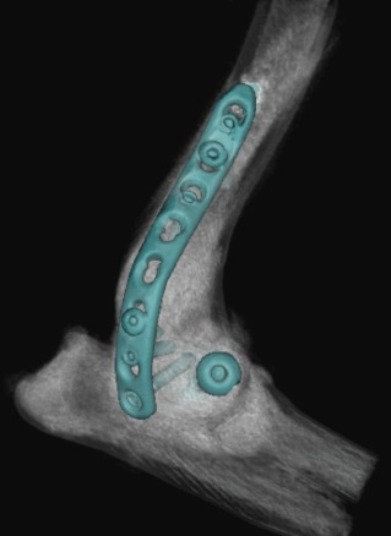French Bulldogs predisposed to catastrophic elbow fractures, according to RVC research
Fractures of the elbow joint (humeral condyle fractures – see figure 1) can be challenging to repair and in certain dog breeds can happen with minimal trauma, often when dogs are quite young. These fractures are painful and cannot be managed successfully without surgery. Surgeons in the Orthopaedic Clinic at the RVC Queen Mother Hospital for Animals (QMHA) had an impression of increasing numbers of French Bulldogs being referred for elbow fracture surgery. To explore this question, the Royal Veterinary College’s Small Animal Orthopaedic Service in collaboration with the VetCompass™ programme, ran an extensive study into elbow fractures in dogs.
The study involved reviewing the most recent 112 elbow fractures seen at the QMHA from 43,325 dogs seen over the same time period in the hospital. The study clearly showed a statistically significant predisposition in the French Bulldog which was 8 times more likely to have suffer an elbow fracture than cross breed dogs.

Figure 1: CT scan 3D reconstruction of a fractured elbow joint

Figure 2: CT scan 3D reconstruction after surgery to repair the fracture with metal plates and screws.
The study also identified that the French Bulldog was nearly 7 times more likely than other breeds to fracture one side (medial) of the elbow vs the other side (lateral) suggesting that their elbow shape may be influencing how their elbows break. It was also shown that repairs which included an additional metal plate (Figure 2) had a better outcome, and this recommendation will be shared widely so that other veterinary surgeons can give the best standard of care for the dog they operate on.
Overall this study showed the outcomes were good with surgery, however there is a significant welfare impact of suffering elbow fractures and surgery is required to achieve this. There is a clear case therefore for identifying why French Bulldogs have increased risk with the aim to improving breeding programmes and developing improved genetic assessment tools to reduce the burden of elbow fractures. Dr Richard Meeson, Head of Orthopaedics at the RVC and senior author of the paper said: “This study has provided hard evidence of what we had noticed in the hospital in recent years; high numbers of French Bulldogs being referred to repair elbow fractures, typically on the side of the elbow that we rarely operate on. This suggests that there may be an inherent issue with their elbow predisposing them to fractures and we will continue to investigate this in the hope we can reduce these severe fractures”.
Dr Dan O’Neill, senior lecturer at the RVC and co-author of the paper said: “The UK is currently in the midst of a population explosion of French Bulldogs. While these dogs may seem very attractive to own, they have many intrinsic health issues. This study adds yet another key predisposition for a very painful orthopaedic condition that owners and veterinarians need to add to the list of conditions to monitor for in this breed”.
Citation:
Impact of breed on canine humeral condylar fracture configuration, surgical management, and outcome. Sanchez Villamil C, Phillips ASJ, Pegram CL, O'Neill DG, Meeson RL. Vet Surg. 2020 Apr 20. doi: 10.1111/vsu.13432. The full paper is open access and now available.
This article has been selected by the Editor-in-Chief of the journal as an Editor's Choice article. It was selected for its originality, relevance to the audience and impact on the field.
